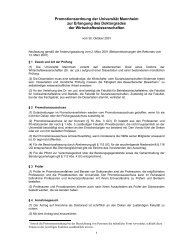Sommersemester 2006 - Abteilung Volkswirtschaftslehre der ...
Sommersemester 2006 - Abteilung Volkswirtschaftslehre der ...
Sommersemester 2006 - Abteilung Volkswirtschaftslehre der ...
Sie wollen auch ein ePaper? Erhöhen Sie die Reichweite Ihrer Titel.
YUMPU macht aus Druck-PDFs automatisch weboptimierte ePaper, die Google liebt.
implications are also very important and are highlighted by current policy<br />
issues.<br />
Contact person: PD Dr. Friedhelm Pfeiffer, Tel. 1235-150, eMail:<br />
pfeifferzew.de<br />
Topics in Dynamic Macroeconomics<br />
Vorlesung, 2st.<br />
Di wtl13.45-15.15 25.04.-18.07.<strong>2006</strong><br />
Ludwig, Alexan<strong>der</strong><br />
L 7 P043<br />
1. Time and location:<br />
Lecture in the Summer semester <strong>2006</strong>, 2 hours per week.<br />
Tuesdays, 13.45-15.15 h<br />
2. First lecture: Tue, April 25, 13.45h<br />
3. Office hours: tba.<br />
4. Course homepage:<br />
To be posted somewhere on http://www.mea.uni-mannheim.de/alexludwig/<br />
5. Adressees:<br />
The course is designed for advanced students in the diploma studies<br />
program. It is also designed for 2nd year students in the doctoral program.<br />
6. Prerequisites:<br />
Successful participation in the Macro sequence (Macro III would be nice to<br />
have).<br />
7. Grading:<br />
Grading will be based on a final exam (40-50 %), a short term paper (10%)<br />
(why that?, see below), problem sets (30%) and class participation (20%).<br />
The grading of students of the doctoral program is separate and has a<br />
different basis.<br />
8. Concept for the course:<br />
We will study variants of the two "workhorses" of dynamic macroeconomics<br />
in general equilibrium: the neoclassical growth model and overlapping<br />
generations (OLG) models. While both models will be analyzed, more room<br />
will be given to life-cycle economies (OLG type applications). For this<br />
reason, we will also extensively study partial equilibrium models of<br />
household behavior, e.g., the dynamics of consumption, savings, labor<br />
supply and portfolio allocation decisions over the life-cycle. Once we<br />
un<strong>der</strong>stand this, we will return to general equilibrium. The course will be<br />
applied in a sense that (i) we will seek to compare certain model features<br />
with the data, (ii) we will implement some stuff on the computer and (iii) we<br />
will analyze policy questions. Among these policy questions are issues<br />
related to the distribution of income, wealth and consumption within and<br />
across generations, public finance questions and how demographic change<br />
will affect the economy in a global world. At the end of the course you will<br />
have learned how to solve simple models analytically and more complicated<br />
17















